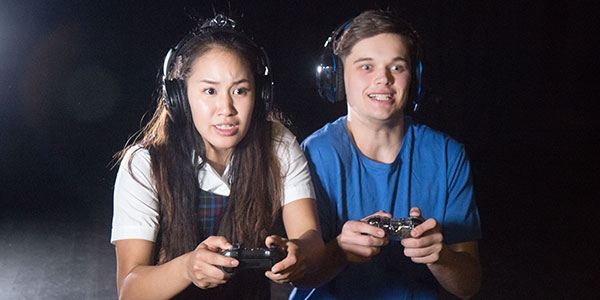The popularity of digital and online games is rapidly increasing, and it doesn’t look like slowing down! Not only are more people playing games, but they’re also watching other people play through live streaming and esport tournaments.
Many parents and teachers are concerned by the fervour surrounding games like Fortnite and the increasing use of games among primary school students. But no matter how you feel about gaming, there’s one thing you can be sure of: gaming is here to stay.
So what’s good about gaming?
We spoke to a 17-year-old gamer Max (not his real name) about why he plays video games and what he loves about them.
As expected, Max’s top reason is entertainment – games are just fun! They allow you to explore different worlds, solve puzzles and work towards a goal. Some people use gaming to relieve stress, as a way to relax and unwind at the end of the day. According to technology and learning researcher Joanne Orlando, many kids play games as a form of escapism, and because they’re often creative, complex and allow them to achieve success.

Gaming provides an opportunity for social interaction. Whether it’s gaming with friends in the same physical space, or communicating virtually through the game, games provides a shared focus, interest and goal. These interactions can lead to further connections in the real world and help kids meet their social needs. Friendships that start with gaming often extend to other shared interests and hobbies, like merchandise collecting, fan art, films, books, sports or non-digital games. Team-based games may also promote cooperation and communication skills.
Max believes games have helped him develop valuable skills, many of which can be applied in the real world, like problem-solving, reaction time and coordination. And research does suggest that gaming is associated with improvements in cognitive skills such as visual processing, attention, problem-solving and creativity. Specific skills like touch typing, budgeting and financial decision-making can also be developed as a result of playing games.
Games can impart knowledge about the world and historical events. And while not all games have a positive message, some encourage critical thinking about ethics, values and consequences. The increasing popularity of ‘serious games’ indicates that many parents and educators are now using games to facilitating learning.
Here at Brainstorm Productions, we love that games can be used as a theatrical tool. Many of our theatre in education performances place the characters inside a game, allowing them to explore fantastical worlds where anything can happen.

One of our primary school performances ‘Buddies’ is set entirely within a game, where the goal is to collect a series of magical discs. The characters navigate strange environments, solve puzzles, wrangle dragons and grapple with moral dilemmas in order to reach their goals. The characters must work as a team in order to find the key to true friendship. By placing a plot-driven game at the centre of the performance – a medium that most students love and are familiar with – we can help students become more immersed in the experience.
What are the risks of gaming?
While most people enjoy problem-free gaming, it isn’t always fun. Our 17-year-old gamer Max identifies one of the major hazards as ‘toxic’ players who bully, harass, troll or abuse other players, often under the cloak of anonymity.
Safety is also an issue, particularly for children and young people. The Office of the eSafety Commissioner warns grooming is a real risk within online games, and predators do use games to target children.
Security risks are also rife in online gaming. Scammers create unsecure websites, fake messages requesting financial information, offers of free games or surveys that trick players into giving up their personal details. While the game companies are now doing more to protect their users, security is still a major issue that all players should be aware of.

Max points out that some kids spend too much time on games. This can cause them to neglect other parts of their life such as family, friends, school or work. They might become obsessed with one game and their interests become restricted. They can lose touch with friends and forget how to socialise outside the game.
Excessive gaming can impact on sleep, with some kids playing late into the night. This can cause them to feel tired and have difficulty concentrating at school. They may neglect their diet and spend little to no time doing physical activities.
While only a small proportion of people will experience serious issues with gaming, it’s important to know the signs that gaming is becoming a problem for a child or young person. The Office of the eSafety Commissioner notes that kids might become withdrawn, isolated and spend more time in their room. They may be tired all the time or not be looking after their personal hygiene. As Max points out, they might feel angry and anxious, and become obsessed with playing one particular game.
According to the World Health Organisation, Gaming Disorder may be diagnosed when someone has limited control over their gaming behaviour, prioritises gaming over other activities and interests, and continues or escalates their game-play despite negative consequences. This diagnosis applies only when the problems are sufficiently severe to cause significant impairment in important areas of functioning, and if it has been going on for an extended period of time (i.e. 12 months or more). These problems may also be related to other mental health issues, such as anxiety or depression.
The inclusion of Gaming Disorder in the ICD-11 has been the topic of hot debate recently, and further research is needed to better understand this issue. But if you think a young person is having problems with gaming, it’s important to get help.
Tips for safe and healthy gaming
Max gave us his top tips for maintaining healthy gaming habits and staying safe on gaming sites.
1. Balance digital gaming with other activities, hobbies and interests
Spend time with friends doing offline activities, like walking, watching movies, playing team sports or playing non-digital games. Even if your common interest is online gaming, and even if you talk about games while you’re doing other things, you need to have balance! Keep a regular routine that involves going to bed at a normal time, eating a healthy diet and doing regular exercise.
2. Play games with other people ‘
Playing games within a social setting will reduce isolation and help maintain meaningful relationships with friends and peers. Games are a great way to stay connected if you have difficulty socialising and tend to spend time alone.

3. Play a range of different games
Max finds this helpful for keeping things in perspective and avoiding becoming obsessed with one particular game. He suggests playing games casually and not getting too competitive. He points out that only a tiny proportion of players will go on to become an esports ‘pro’, so there’s no need to spend all your time on one platform.
4. Be alert to predators and scammers
Game companies and streaming platforms are becoming increasingly aware of security and safety risks, and many run ‘bots’ through their content to ensure anything inappropriate is removed and the offending users are ‘timed out’ or blocked. This is not fool-proof, however, and players need to put in place safeguards to protect themselves. For example, only play games that are appropriate for your age. Don’t share personal details with people you don’t know. And avoid purchasing games or in-game currency from third parties, no matter how good the deals appear to be – stick to the official sites!
5. If something goes wrong, report it
If you suspect you’ve been scammed, or if you’ve received inappropriate or abusive material, tell a trusted adult and report it to the game’s official support site – they may be able to freeze or block the user’s account until things are resolved.
Where to go for more information
The Office of the eSafety Commissioner provides advice for parents and schools about cyber safety for students and setting limits around screen time. They also provide advice on how to respond to cyberbullying and detailed information about specific games, apps and sites.
Brainstorm Productions is a theatre in education company that offers cyber safety education, anti bullying programs and student wellbeing programs for primary and high school students. We address issues such as screen time, healthy behaviours, cyberbullying, online ethics and positive relationships. Click here for information about our 2019 schedule.
By Dr Ameika Johnson, Brainstorm Productions




